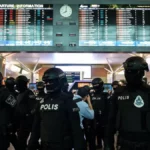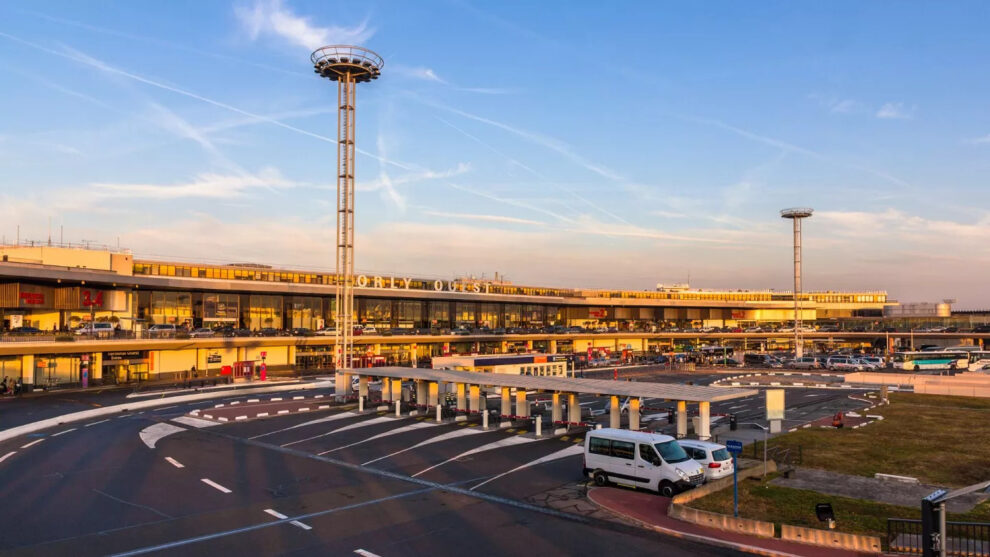An October strike could still impact people travelling to the Rugby World Cup quarter finals.
Sports fans will be spared from airport chaos during the Rugby World Cup this week.
France’s largest union for air traffic controllers (SNCTA) was threatening to stage a nationwide strike on Friday 15 September.
However, it announced on its website on Tuesday that “an agreement has been reached” and the strike is cancelled.
The deal reached with France’s civil authority (Direction générale de l’Aviation civile or DGAC) includes pay increases for union members and plans to discuss new salary benchmarks for next year.
The union has also pledged not to strike during the Paris Olympic Games in 2024.
A general strike planned for 13 October is still expected to go ahead, however. Any strikes must be announced 48 hours in advance.
Where is the Rugby World Cup taking place?
Rugby World Cup matches will be played at stadiums across France.
These include Stade Geoffroy-Guichard in Saint-Étienne, Stade de Bordeaux, Stade de Marseille, Stadium de Toulouse, Stade Pierre-Mauroy in Villeneuve-d’Ascq, Stade de Nice, Stade de la Beaujoire in Nantes, OL Stadium in Lyon, and Stade de France in Saint-Denis, Paris – where the final will take place.
More than 2.5 million tickets have been sold, with a record 600,000 spectators expected to travel from outside of France.
60 per cent of international fans attending the games are from the UK, Michel Poussau, World Rugby’s chief of events and Rugby World Cup 2023 executive director, told industry news publication SportsPro. A lot of spectators from Australia, the Netherlands and New Zealand are also expected to attend.
The strike on 15 September would have coincided with the New Zealand vs Namibia game at Stadium de Toulouse, followed by Samoa vs Chile at Stade de Bordeaux, and Wales vs Portugal at Stade de Nice. People travelling in advance to see Ireland vs Tonga at Stade de la Beaujoire on 16 September could have also been affected.
While there are no matches on 13 October, the walkout could impact fans travelling in advance to the quarter-final on 14 October.
Since the air traffic control strikes would be nationwide, airports across the country could be affected.
Why do French air traffic control strikes affect flights across Europe?
Earlier this year, French air traffic control strikes caused mayhem even for travellers whose flights were not taking off or landing in the country.
Because of the country’s central European location, many flights make their way over it on their journey to other destinations. These ‘overflights’ are also affected when French air traffic controllers go on strike.
This causes delays and cancellations in nearby countries such as Spain, the UK, Germany and Italy.
In total, more than 10 million passengers were hit with delays or cancellations due to the strikes in March. Around half of these people are likely to have been on a flight that was only passing over France.
During the 1 May strikes, 33 per cent of flights were cancelled at Paris’s Orly airport, Marseille, Lyon, Bordeaux and Nantes, while 25 per cent were cancelled at Paris Charles de Gaulle, Beauvais and Nice.
Paris Metro workers could also strike during the Rugby World Cup
Public transport has been hit by strikes during the Rugby World Cup, with Paris Metro workers threatening to walkout during the games.
While train drivers will receive a bonus in recognition of the additional services they must run during the event, station staff have not been offered additional pay.
Members of trade union FO-RATP, which represents public transport workers in Paris, have threatened to walk out over the issue. But so far, participation in the strikes has been limited. Negotiations are currently ongoing.
Source : Euronews















